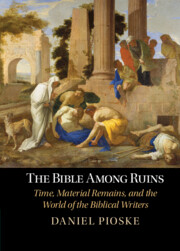Although biblical scholars are increasingly turning their attention to the question of God’s body, few clarify how precisely this “body” complicates the long-held claim that God is immaterial. The present article addresses this oversight by attending to the ways in which biblical accounts of God’s body intersect with wider tradents of thought on materiality and immateriality, including, above all, the recent cross-disciplinary “turn” known as new materialism. The article begins by discussing what biblical scholars mean when they say “God’s body” and how biblical theophanies in particular complicate the belief that God is immaterial. It then discusses new materialism and how key emphases in this scholarly shift similarly complicate the belief in God’s immateriality. Third and finally, the article returns to biblical theophanies by reading these accounts through a new materialist lens, focusing in particular on God’s manifestations in material, nonhuman forms. In the end, I suggest not only that biblical theophanies problematize traditional ways of conceiving God within the history of biblical interpretation but also that new materialism can better enable us to see how these accounts portray the relationship between God and embodied materialities.


